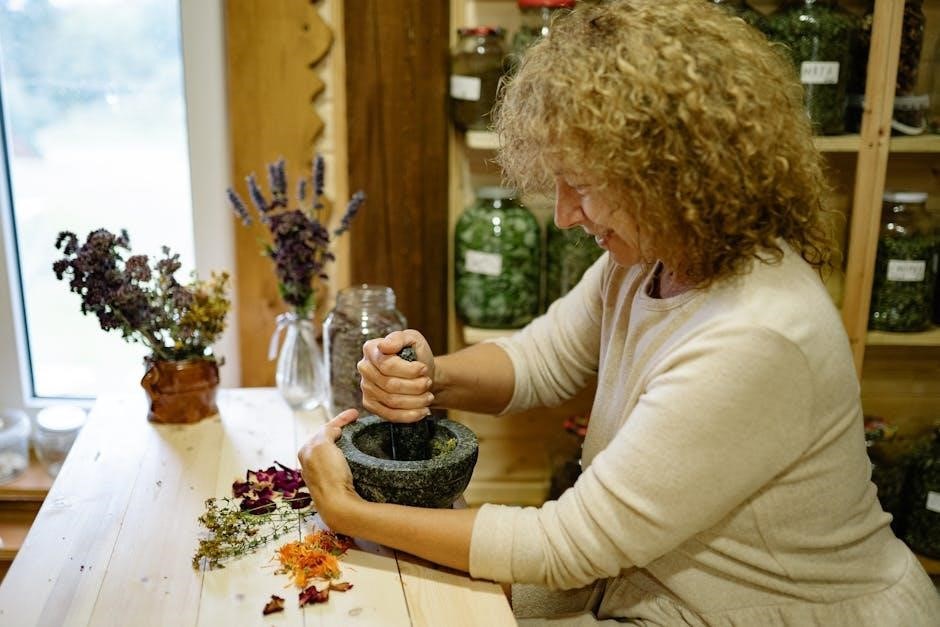Home remedies offer simple, natural solutions for common ailments, promoting health without complex treatments. They empower individuals to take charge of their well-being using accessible ingredients.
Overview of Natural Healing Methods
Natural healing methods focus on using herbs, plants, and lifestyle changes to restore balance and health. These approaches often emphasize holistic well-being, addressing the root cause of ailments rather than just symptoms. Techniques include herbal teas, essential oils, and dietary adjustments. Many methods are cost-effective and have minimal side effects, making them appealing for everyday use. By boosting the immune system and promoting self-healing, natural remedies offer a sustainable approach to maintaining health and preventing illnesses. This holistic perspective distinguishes them from conventional treatments, providing a comprehensive path to wellness.
Importance of Home Remedies in Modern Healthcare
Home remedies play a significant role in modern healthcare by offering accessible, cost-effective solutions for common ailments. They empower individuals to manage health independently, reducing reliance on pharmaceuticals. Natural healing methods are often holistic, addressing both physical and mental well-being. These remedies are particularly valuable for minor conditions, preventing them from escalating. Additionally, they complement conventional treatments, providing relief without harmful side effects. By integrating traditional wisdom with modern practices, home remedies bridge gaps in healthcare, making them a vital part of today’s health landscape.

Common Respiratory Diseases and Their Home Remedies
Respiratory issues like colds, coughs, and asthma can be effectively managed with home remedies. Natural solutions, such as steam inhalation and herbal teas, provide quick relief.
Natural Remedies for the Common Cold
Natural remedies can effectively tackle common cold symptoms like sneezing, congestion, and sore throats. Herbal teas with ginger, lemon, and honey soothe the respiratory system. Steam inhalation with eucalyptus oil helps clear nasal blockages. Honey, known for its antibacterial properties, can calm a sore throat. Staying hydrated with warm fluids, such as broth or herbal infusions, supports recovery. Rest and a balanced diet also play a crucial role in overcoming the cold naturally.
Home Treatments for Cough and Sore Throat
Home remedies for cough and sore throat focus on soothing irritation and reducing inflammation. Honey, with its antibacterial properties, is a popular natural remedy for calming sore throats and suppressing coughs. Warm saltwater gargles can reduce throat swelling and kill bacteria. Drinking warm liquids, such as ginger tea or lemon water, helps ease discomfort. Staying hydrated is essential to thin mucus and promote healing. These simple, accessible treatments provide relief without the need for medication, making them ideal for mild to moderate symptoms.
Herbal Remedies for Asthma and Bronchitis
Herbal remedies for asthma and bronchitis focus on reducing inflammation and improving breathing. Ginger, known for its anti-inflammatory properties, can be consumed as tea or added to meals. Eucalyptus oil, when inhaled, helps clear airway congestion. Turmeric, rich in curcumin, aids in reducing inflammation. Warm herbal teas, such as peppermint and chamomile, soothe irritated airways. Honey, with its soothing effects, can be added to drinks to calm coughs. These natural remedies provide relief and support respiratory health when used consistently and in moderation.
Digestive Disorders and Their Home-Based Solutions
Digestive issues like indigestion and bloating can be effectively managed with natural remedies. Ginger, herbal teas, and probiotics help soothe the stomach and restore balance.
Home Remedies for Indigestion and Heartburn
Natural remedies can alleviate indigestion and heartburn effectively. Ginger, known for its anti-inflammatory properties, can be consumed as tea or added to meals. Chamomile tea also soothes the digestive system, reducing inflammation and discomfort. Additionally, aloe vera juice and licorice root extracts are popular for their calming effects on the stomach lining. These remedies work by neutralizing stomach acid and improving digestion, providing quick relief from discomfort.
Practicing portion control and avoiding heavy, spicy, or fatty foods can prevent indigestion. Drinking plenty of water and incorporating probiotics, such as yogurt, can further support digestive health and prevent heartburn episodes. These home-based solutions are simple, cost-effective, and often more gentle on the body compared to over-the-counter medications.
Natural Treatments for Constipation and Diarrhea
Natural remedies can effectively manage constipation and diarrhea. For constipation, prune juice, flaxseeds, and psyllium husk are excellent fiber-rich options that promote bowel regularity. Herbal teas like chamomile or dandelion root also stimulate digestion. For diarrhea, probiotics in yogurt or apple cider vinegar help restore gut balance. Staying hydrated with coconut water or electrolyte-rich drinks is crucial. These remedies are gentle, non-invasive, and often more effective than medications, offering relief without side effects.
Herbal Solutions for Stomach Ulcers
Herbal remedies provide effective relief for stomach ulcers by soothing the digestive tract and promoting healing. Aloe vera juice, known for its anti-inflammatory properties, can reduce irritation and aid in ulcer repair. Licorice root, particularly deglycyrrhizinated licorice (DGL), protects the stomach lining and accelerates recovery. Chamomile tea is another calming option, reducing inflammation and discomfort. These natural remedies, when consumed as teas or extracts, offer a gentle alternative to conventional treatments, supporting gut health and preventing further irritation.

Skin Conditions and Their Natural Remedies
Natural remedies offer effective solutions for skin conditions like acne, eczema, and psoriasis. Ingredients such as aloe vera, coconut oil, and turmeric can soothe irritation and promote healing.
Home Remedies for Acne and Pimples
Acne and pimples can be effectively managed with natural remedies. Aloe vera gel soothes inflammation and reduces redness, while tea tree oil’s antibacterial properties combat acne-causing bacteria. Apply a few drops of diluted tea tree oil to affected areas using a cotton swab. Turmeric paste, made with turmeric powder and water, reduces inflammation and prevents scarring. Green tea, rich in antioxidants, can be used as a cooled toner to balance skin pH. Regular application of these remedies helps maintain clear and healthy skin.
Natural Treatments for Eczema and Psoriasis
Natural treatments can alleviate eczema and psoriasis symptoms. Coconut oil moisturizes and soothes dry, itchy skin, while oatmeal baths reduce inflammation. Turmeric, with its anti-inflammatory properties, can be consumed in warm water or applied topically. Apple cider vinegar balances skin pH and reduces scaling when diluted and applied. Aloe vera gel provides cooling relief and promotes healing. These remedies, when used consistently, help manage skin conditions naturally and effectively, improving skin health and reducing discomfort.
Herbal Remedies for Fungal Infections
Herbal remedies effectively combat fungal infections naturally. Tea tree oil, known for its antifungal properties, can be applied topically after dilution. Garlic, rich in antifungal compounds, can be consumed raw or used as a paste. Oregano oil, mixed with a carrier oil, helps fight infections. Aloe vera soothes skin irritation, while apple cider vinegar balances pH levels when applied externally. These remedies, when used consistently, provide relief from fungal infections and promote healthy skin, offering a natural alternative to conventional treatments.

The Safety and Effectiveness of Home Remedies
Home remedies are generally safe and effective when used correctly. Natural ingredients like herbs, oils, and spices can alleviate symptoms without harsh side effects, but precautions are essential.
When to Use Home Remedies
Home remedies are ideal for mild, common ailments like colds, indigestion, or skin irritations. They are best used when symptoms are manageable and not severe. For instance, herbal teas can soothe a sore throat, while natural oils may ease minor burns. However, for severe conditions or persistent symptoms, professional medical advice is crucial. Always consider the severity of the illness and the individual’s health history before opting for home remedies. Consulting a healthcare provider is recommended for chronic or unclear conditions.
Precautions and Potential Risks
While home remedies can be effective, caution is essential. Allergic reactions to herbs or ingredients can occur, and some remedies may interact with medications; Proper preparation and dosage are crucial to avoid adverse effects. Certain conditions, like severe allergies or chronic illnesses, require medical supervision. Pregnant women and children should consult a healthcare provider before using home remedies. Additionally, contamination or incorrect usage can lead to health risks. Always prioritize safety and seek professional advice if symptoms persist or worsen.
Scientific Evidence Supporting Home Remedies
While home remedies are widely used, their effectiveness often relies on anecdotal evidence rather than rigorous scientific studies. Some natural remedies, such as honey for coughs or ginger for nausea, have limited scientific support. However, others, like turmeric for inflammation, show promise in clinical trials. It’s important to distinguish between remedies backed by research and those lacking evidence. Always consult healthcare professionals before using home remedies, especially for chronic conditions, to ensure safety and avoid potential interactions with medications.

How to Prepare Home Remedies
Preparing home remedies involves gathering fresh ingredients, following simple recipes, and ensuring proper hygiene. Use measuring tools for accuracy and consult a professional for complex methods.
Essential Ingredients for Home Remedies
Common ingredients like honey, ginger, turmeric, and aloe vera are staples in home remedies. Honey soothes coughs, while ginger aids digestion. Turmeric reduces inflammation, and aloe vera heals skin. Herbs such as peppermint and chamomile are used for teas and calming effects. Natural oils like coconut and olive oil moisturize and protect skin. Garlic and onion have antibacterial properties, often used in immune-boosting remedies. Lemon and vinegar are popular for their cleansing and antiseptic qualities. These ingredients are easily accessible and form the foundation of many effective home treatments.
Step-by-Step Preparation Methods
Preparing home remedies often involves simple steps. For herbal teas, steep herbs in boiling water, then strain and drink. Mix natural ingredients like honey and lemon for cough relief. Apply aloe vera gel directly to skin irritations. Blend ingredients into pastes or salves for topical use; Ensure all materials are clean and stored properly. Follow specific ratios for effectiveness and safety. Some remedies require fermentation or heating, while others are used raw. Always test a small area or dose before full application or consumption.
Storage and Shelf Life of Remedies
Proper storage is key to maintaining the potency of home remedies. Most herbal remedies should be stored in airtight containers in a cool, dark place to prevent degradation. Remedies like salves or ointments can last up to 6 months if stored correctly, while teas and infusions are best consumed fresh. Label and date all preparations for easy identification. Check remedies regularly for signs of spoilage, such as mold or rancid odors. Always use clean utensils when handling stored remedies to ensure safety and effectiveness.
Dosage Guidelines for Home Remedies
Correct dosage is crucial for safety and effectiveness. Start with small amounts and adjust based on age, health, and tolerance. Always consult a professional for personalized advice.
Recommended Dosages for Common Remedies
For herbal remedies, typical dosages range from 1-2 teaspoons of dried herbs per cup of boiling water, steeped for 5-10 minutes. Honey and lemon can enhance effectiveness. For coughs, warm water with ginger and turmeric is often recommended. Always measure accurately, especially for children and the elderly. Start with small doses to gauge tolerance. Consult a healthcare professional for personalized advice, as overuse can lead to side effects. Adjustments may be needed based on individual health conditions.
Adjusting Dosages for Different Age Groups
Dosages for home remedies vary by age to ensure safety and effectiveness. Infants under 6 months should avoid most remedies unless advised by a pediatrician. Children aged 6–12 years often require half the adult dosage, while teenagers may use adult amounts. Adults can follow standard guidelines but should adjust for chronic conditions. Elderly individuals may need reduced dosages due to slower metabolism. Always consult a healthcare professional for personalized advice to avoid risks and ensure proper treatment.
Understanding Overdose Risks
Overdosing on home remedies can lead to adverse effects, even if ingredients are natural. Herbs, vitamins, and essential oils, when overused, may cause toxicity. Common risks include allergic reactions, stomach issues, or organ strain. Signs of overdose include nausea, dizziness, or skin rashes. To prevent this, always follow recommended dosages and consult a healthcare professional, especially for children or those with chronic conditions. Be cautious with potent substances and monitor reactions to ensure safe and effective treatment.
Home remedies offer natural, cost-effective solutions for common ailments, empowering individuals to manage health naturally. Always consult healthcare professionals for severe or persistent conditions to ensure safe outcomes.
Final Thoughts on Home Remedies
Home remedies are a practical and accessible way to address common ailments, offering natural solutions that empower individuals to take control of their health. Many remedies, such as herbal teas, honey, and essential oils, have been used for centuries and are supported by both tradition and emerging research. While they can be effective for mild conditions, it’s crucial to balance their use with professional medical advice, especially for severe or chronic illnesses. Always prioritize safety and consult healthcare providers when unsure. Home remedies are not a replacement for modern medicine but can complement it, promoting holistic well-being. By understanding their benefits and limitations, individuals can make informed decisions to enhance their health naturally.
Encouragement to Consult Healthcare Professionals
While home remedies can be effective for mild ailments, it’s essential to consult healthcare professionals for severe or persistent symptoms. They provide personalized advice, diagnose underlying conditions, and ensure safe treatment. Delaying medical consultation can worsen illnesses, so seeking expert care is crucial for chronic diseases or unclear symptoms. Professionals offer evidence-based solutions, preventing potential risks. Always combine home remedies with medical guidance for comprehensive care and better health outcomes.